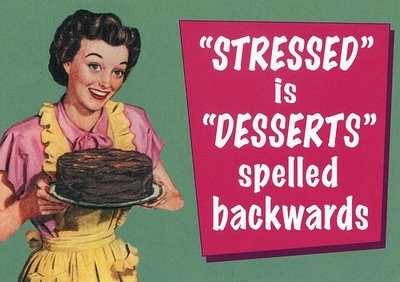
Food cravings would be no problem if they were for broccoli and kale. How perfect would that be? But those aren”™t the foods — or kinds of foods — we tend to crave, mainly because they don”™t cause much (if any) change in brain chemistry.
Cravings tend to be for foods that feel like comfort foods: from Christmas cookies and other holidays treats to plain old mac and cheese. Foods with sugar, flour and fats are the go-to comfort foods — and the ones we crave — because they”™re big brain chem changers.
This short post will cover two ways that cravings can sabotage us: 1) by derailing a weight-loss plan, and 2) by derailing our work productivity.
Cravings and Weight Loss
Cravings prompt many of us to eat the foods we crave. Before you say, “Duh”, that”™s not as obvious as it seems. It”™s definitely possible to eliminate cravings so they don”™t make us eat those foods.
But let”™s say you haven”™t eliminated the cravings and you do eat what you”™ve been craving. The foods you eat will often make you eat more — yes, more of the craved stuff, but also more food in general.
The endorphins (beta-endorphin) triggered by sugary foods, for example, can inhibit the part of the brain responsible for satiety — the feeling that we”™ve had enough food and don”™t need any more for a while. And the meal can just keep going.
Those endorphins can also make us eat different foods than we typically would. They might lead us to eat more sugar, more fat, or both. Even if you”™re just looking for something sweet, that sweet treat will often also contain fat and provide far more calories than you expected.
Obviously, weight-loss plans end up suffering as a result. An effective short-term fix for any craving is a teaspoon of liquid B-complex. (Please check with your doctor to be sure this is a strategy you can safely use.) If your doctor gives you the okay, the craving will be gone in a matter of minutes.
Cravings and Work Productivity
If you eat sweet or starchy foods when you crave them, both trigger a high release of insulin. That can cause sleepiness or “fogginess” that call out for a caffeine fix. It”™s especially true for those who are carb-sensitive — who produce more insulin after eating sugar, for example.
Who is carb sensitive? Typically, anyone with a family history of hypertension, alcoholism, diabetes, hypoglycemia, or obesity.
Extra caffeine may work, but may lose some of its effectiveness if you”™ve had lots of coffee during the day already. Staying alert and productive is far easier when you balance out any high insulin-triggering foods with protein and lots of vegetables.
Plant sources of protein have commanded much attention lately, but may not provide enough protein to balance out the insulin effects in someone who”™s carb-sensitive. If you”™d rather not eat animal proteins, make a point of mixing some vegetable protein powder with water.
Have that mixture anytime you”™ve been giving in to comfort food cravings. It won”™t reverse all the effects of sugars and flour, but it can help.
- New Year’s Resolutions: A Sugar Addict’s Survival Guide - April 15, 2024
- Motivation vs. Enthusiasm - October 12, 2023
- Why Exercise Shouldn’t Be Just One Thing - November 9, 2022

